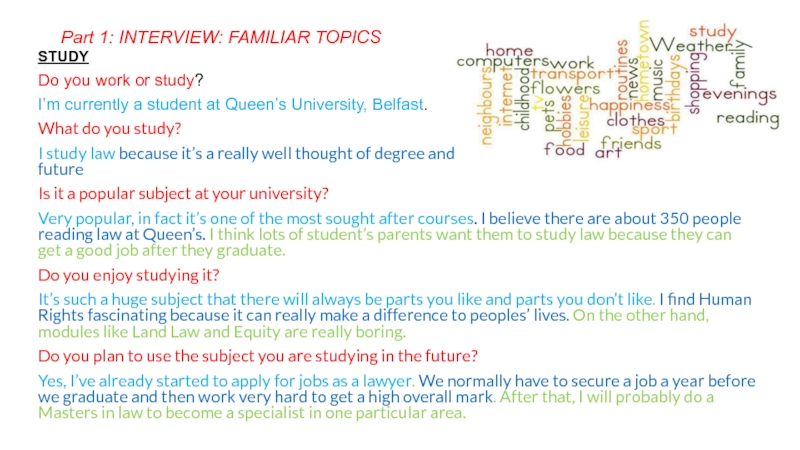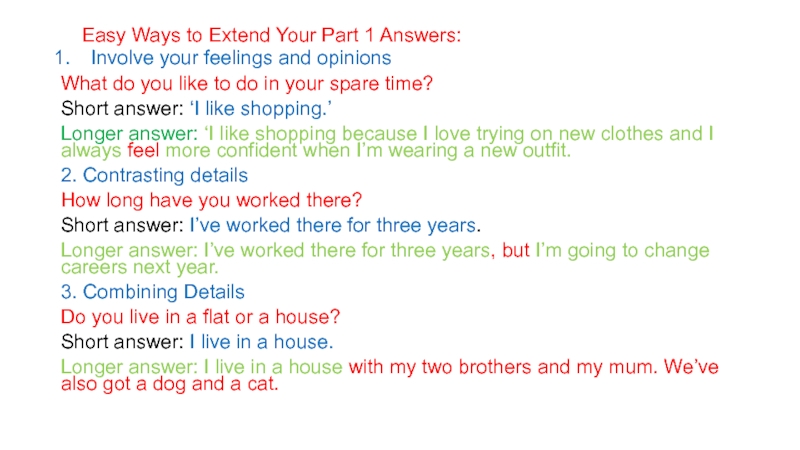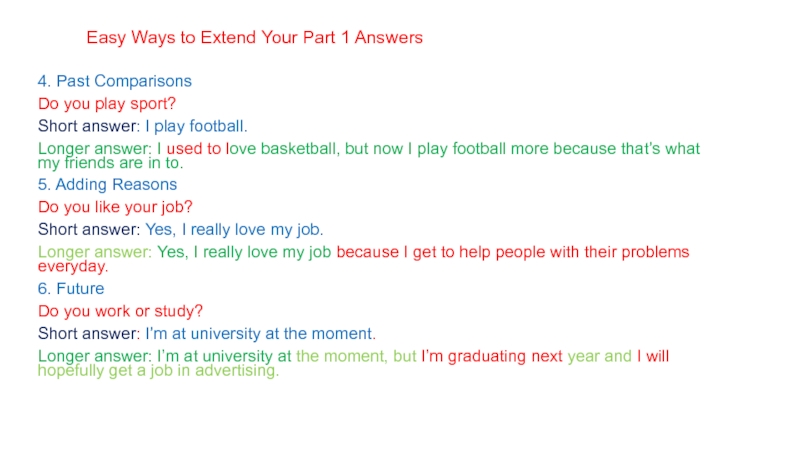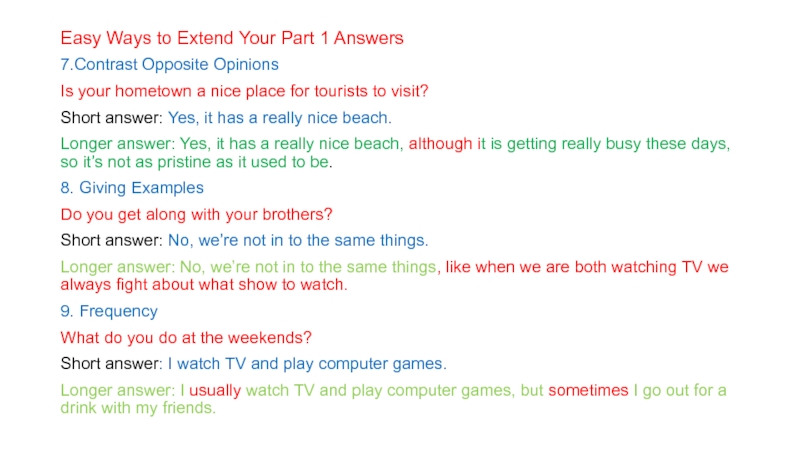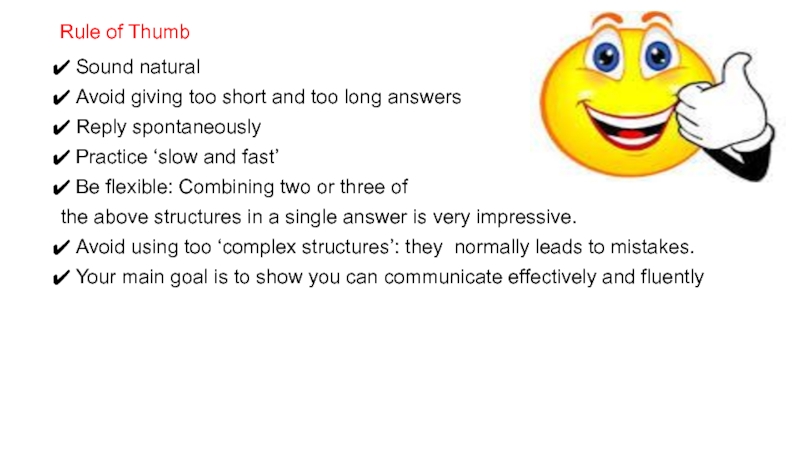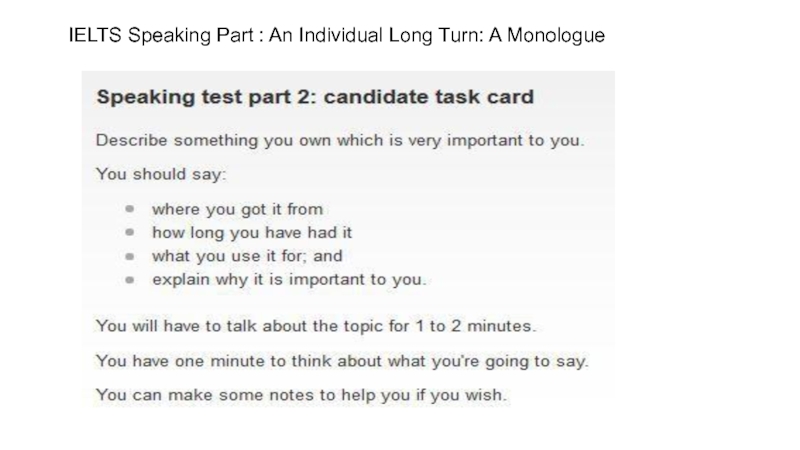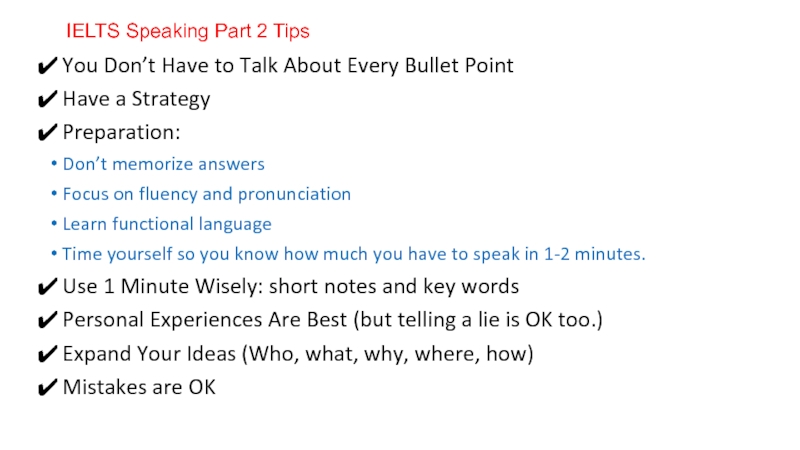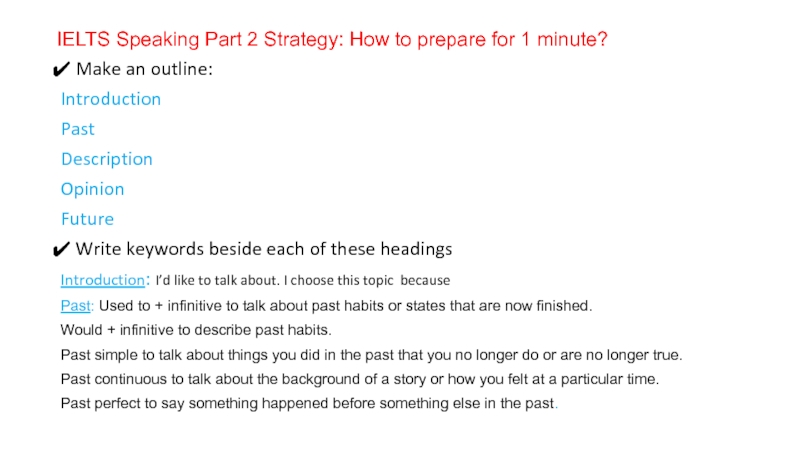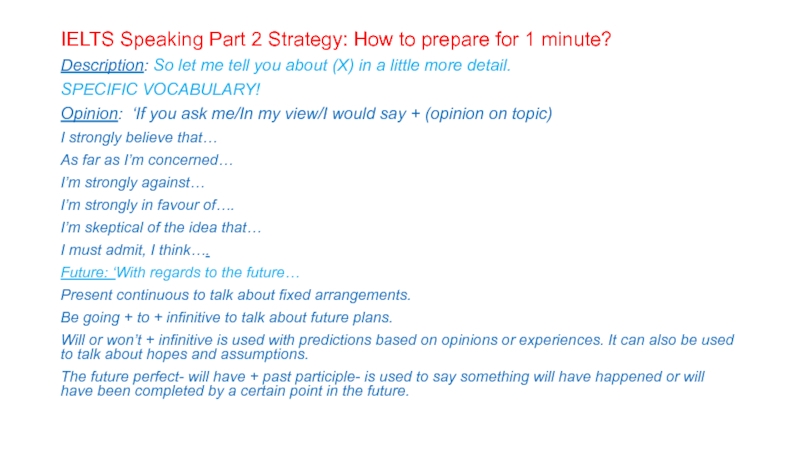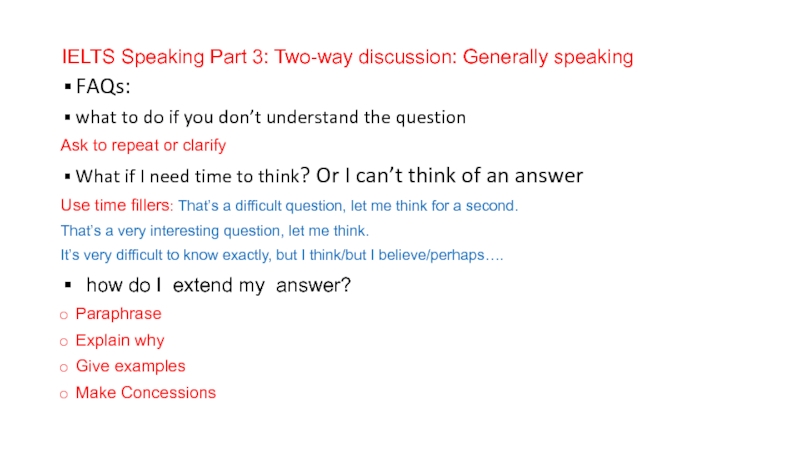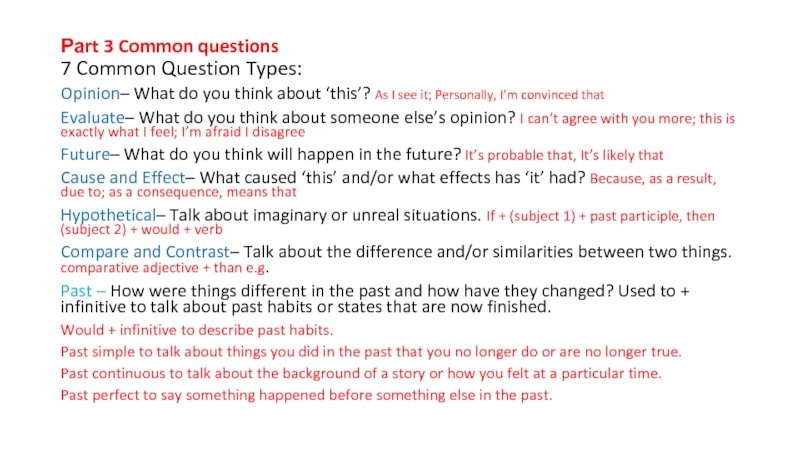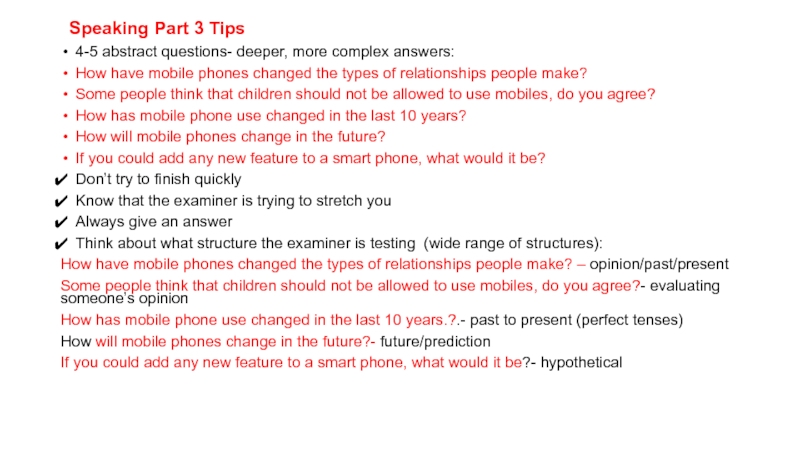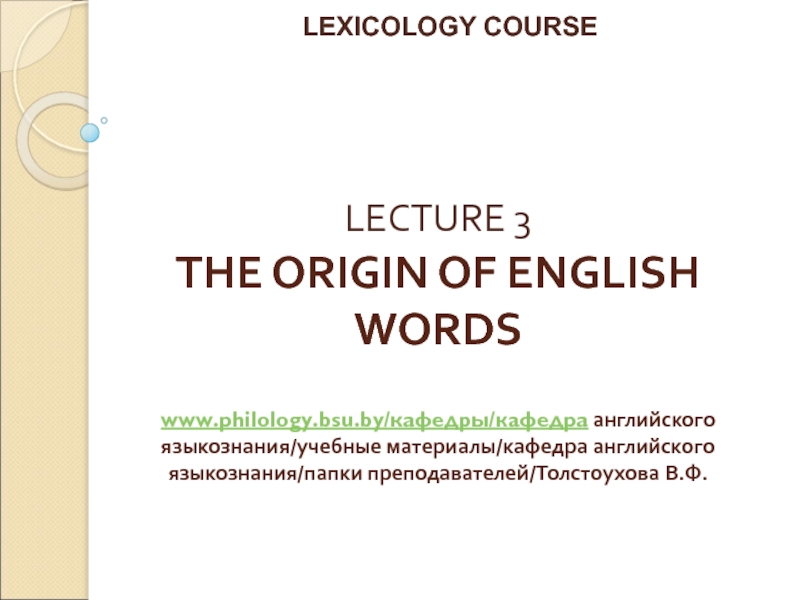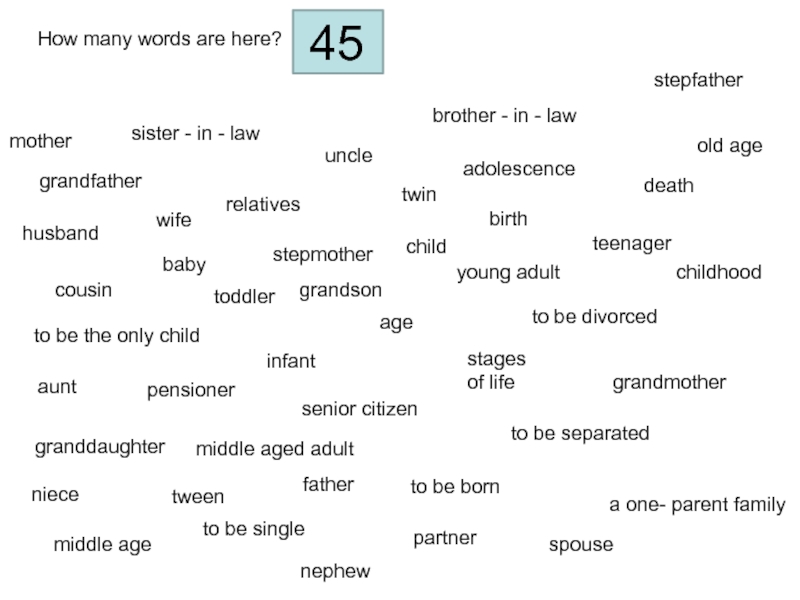- Главная
- Разное
- Дизайн
- Бизнес и предпринимательство
- Аналитика
- Образование
- Развлечения
- Красота и здоровье
- Финансы
- Государство
- Путешествия
- Спорт
- Недвижимость
- Армия
- Графика
- Культурология
- Еда и кулинария
- Лингвистика
- Английский язык
- Астрономия
- Алгебра
- Биология
- География
- Детские презентации
- Информатика
- История
- Литература
- Маркетинг
- Математика
- Медицина
- Менеджмент
- Музыка
- МХК
- Немецкий язык
- ОБЖ
- Обществознание
- Окружающий мир
- Педагогика
- Русский язык
- Технология
- Физика
- Философия
- Химия
- Шаблоны, картинки для презентаций
- Экология
- Экономика
- Юриспруденция
IELTS Speaking. Interview: familiar topics презентация
Содержание
- 1. IELTS Speaking. Interview: familiar topics
- 2. Part 1: INTERVIEW: FAMILIAR TOPICS STUDY Do
- 3. Easy Ways to Extend Your Part 1
- 4. Easy Ways to Extend Your Part 1
- 5. Easy Ways to Extend Your Part 1
- 6. Rule of Thumb Sound natural Avoid giving
- 7. IELTS Speaking Part : An Individual Long Turn: A Monologue
- 8. IELTS Speaking Part 2 Tips
- 9. IELTS Speaking Part 2 Strategy: How to
- 10. IELTS Speaking Part 2 Strategy: How to
- 11. IELTS Speaking Part 3: Two-way discussion: Generally
- 12. Part 3 Common questions 7 Common
- 13. Speaking Part 3 Tips 4-5 abstract
- 14. Useful resources: http://www.ieltsadvantage.com http://www.ieltsspeaking.co.uk/ielts-vocabulary/ http://ielts-simon.com/ http://www.ielts-exam.net/ Vocaroo.com
Слайд 2Part 1: INTERVIEW: FAMILIAR TOPICS
STUDY
Do you work or study?
I’m currently a
student at Queen’s University, Belfast.
What do you study?
I study law because it’s a really well thought of degree and I’m hoping to pursue it as a career in the future
Is it a popular subject at your university?
Very popular, in fact it’s one of the most sought after courses. I believe there are about 350 people reading law at Queen’s. I think lots of student’s parents want them to study law because they can get a good job after they graduate.
Do you enjoy studying it?
It’s such a huge subject that there will always be parts you like and parts you don’t like. I find Human Rights fascinating because it can really make a difference to peoples’ lives. On the other hand, modules like Land Law and Equity are really boring.
Do you plan to use the subject you are studying in the future?
Yes, I’ve already started to apply for jobs as a lawyer. We normally have to secure a job a year before we graduate and then work very hard to get a high overall mark. After that, I will probably do a Masters in law to become a specialist in one particular area.
What do you study?
I study law because it’s a really well thought of degree and I’m hoping to pursue it as a career in the future
Is it a popular subject at your university?
Very popular, in fact it’s one of the most sought after courses. I believe there are about 350 people reading law at Queen’s. I think lots of student’s parents want them to study law because they can get a good job after they graduate.
Do you enjoy studying it?
It’s such a huge subject that there will always be parts you like and parts you don’t like. I find Human Rights fascinating because it can really make a difference to peoples’ lives. On the other hand, modules like Land Law and Equity are really boring.
Do you plan to use the subject you are studying in the future?
Yes, I’ve already started to apply for jobs as a lawyer. We normally have to secure a job a year before we graduate and then work very hard to get a high overall mark. After that, I will probably do a Masters in law to become a specialist in one particular area.
Слайд 3Easy Ways to Extend Your Part 1 Answers:
Involve your feelings
and opinions
What do you like to do in your spare time?
Short answer: ‘I like shopping.’
Longer answer: ‘I like shopping because I love trying on new clothes and I always feel more confident when I’m wearing a new outfit.
2. Contrasting details
How long have you worked there?
Short answer: I’ve worked there for three years.
Longer answer: I’ve worked there for three years, but I’m going to change careers next year.
3. Combining Details
Do you live in a flat or a house?
Short answer: I live in a house.
Longer answer: I live in a house with my two brothers and my mum. We’ve also got a dog and a cat.
The rule of the thumb: not too short and not too long
What do you like to do in your spare time?
Short answer: ‘I like shopping.’
Longer answer: ‘I like shopping because I love trying on new clothes and I always feel more confident when I’m wearing a new outfit.
2. Contrasting details
How long have you worked there?
Short answer: I’ve worked there for three years.
Longer answer: I’ve worked there for three years, but I’m going to change careers next year.
3. Combining Details
Do you live in a flat or a house?
Short answer: I live in a house.
Longer answer: I live in a house with my two brothers and my mum. We’ve also got a dog and a cat.
The rule of the thumb: not too short and not too long
Слайд 4Easy Ways to Extend Your Part 1 Answers
4. Past Comparisons
Do you play sport?
Short answer: I play football.
Longer answer: I used to love basketball, but now I play football more because that’s what my friends are in to.
5. Adding Reasons
Do you like your job?
Short answer: Yes, I really love my job.
Longer answer: Yes, I really love my job because I get to help people with their problems everyday.
6. Future
Do you work or study?
Short answer: I’m at university at the moment.
Longer answer: I’m at university at the moment, but I’m graduating next year and I will hopefully get a job in advertising.
Слайд 5Easy Ways to Extend Your Part 1 Answers
7.Contrast Opposite Opinions
Is your
hometown a nice place for tourists to visit?
Short answer: Yes, it has a really nice beach.
Longer answer: Yes, it has a really nice beach, although it is getting really busy these days, so it’s not as pristine as it used to be.
8. Giving Examples
Do you get along with your brothers?
Short answer: No, we’re not in to the same things.
Longer answer: No, we’re not in to the same things, like when we are both watching TV we always fight about what show to watch.
9. Frequency
What do you do at the weekends?
Short answer: I watch TV and play computer games.
Longer answer: I usually watch TV and play computer games, but sometimes I go out for a drink with my friends.
Short answer: Yes, it has a really nice beach.
Longer answer: Yes, it has a really nice beach, although it is getting really busy these days, so it’s not as pristine as it used to be.
8. Giving Examples
Do you get along with your brothers?
Short answer: No, we’re not in to the same things.
Longer answer: No, we’re not in to the same things, like when we are both watching TV we always fight about what show to watch.
9. Frequency
What do you do at the weekends?
Short answer: I watch TV and play computer games.
Longer answer: I usually watch TV and play computer games, but sometimes I go out for a drink with my friends.
Слайд 6Rule of Thumb
Sound natural
Avoid giving too short and too long answers
Reply
spontaneously
Practice ‘slow and fast’
Be flexible: Combining two or three of
the above structures in a single answer is very impressive.
Avoid using too ‘complex structures’: they normally leads to mistakes.
Your main goal is to show you can communicate effectively and fluently
Practice ‘slow and fast’
Be flexible: Combining two or three of
the above structures in a single answer is very impressive.
Avoid using too ‘complex structures’: they normally leads to mistakes.
Your main goal is to show you can communicate effectively and fluently
Слайд 8 IELTS Speaking Part 2 Tips
You Don’t Have to Talk
About Every Bullet Point
Have a Strategy
Preparation:
Don’t memorize answers
Focus on fluency and pronunciation
Learn functional language
Time yourself so you know how much you have to speak in 1-2 minutes.
Use 1 Minute Wisely: short notes and key words
Personal Experiences Are Best (but telling a lie is OK too.)
Expand Your Ideas (Who, what, why, where, how)
Mistakes are OK
Have a Strategy
Preparation:
Don’t memorize answers
Focus on fluency and pronunciation
Learn functional language
Time yourself so you know how much you have to speak in 1-2 minutes.
Use 1 Minute Wisely: short notes and key words
Personal Experiences Are Best (but telling a lie is OK too.)
Expand Your Ideas (Who, what, why, where, how)
Mistakes are OK
Слайд 9IELTS Speaking Part 2 Strategy: How to prepare for 1 minute?
Make
an outline:
Introduction
Past
Description
Opinion
Future
Write keywords beside each of these headings
Introduction: I’d like to talk about. I choose this topic because
Past: Used to + infinitive to talk about past habits or states that are now finished.
Would + infinitive to describe past habits.
Past simple to talk about things you did in the past that you no longer do or are no longer true.
Past continuous to talk about the background of a story or how you felt at a particular time.
Past perfect to say something happened before something else in the past.
Introduction
Past
Description
Opinion
Future
Write keywords beside each of these headings
Introduction: I’d like to talk about. I choose this topic because
Past: Used to + infinitive to talk about past habits or states that are now finished.
Would + infinitive to describe past habits.
Past simple to talk about things you did in the past that you no longer do or are no longer true.
Past continuous to talk about the background of a story or how you felt at a particular time.
Past perfect to say something happened before something else in the past.
Слайд 10IELTS Speaking Part 2 Strategy: How to prepare for 1 minute?
Description:
So let me tell you about (X) in a little more detail.
SPECIFIC VOCABULARY!
Opinion: ‘If you ask me/In my view/I would say + (opinion on topic)
I strongly believe that…
As far as I’m concerned…
I’m strongly against…
I’m strongly in favour of….
I’m skeptical of the idea that…
I must admit, I think….
Future: ‘With regards to the future…
Present continuous to talk about fixed arrangements.
Be going + to + infinitive to talk about future plans.
Will or won’t + infinitive is used with predictions based on opinions or experiences. It can also be used to talk about hopes and assumptions.
The future perfect- will have + past participle- is used to say something will have happened or will have been completed by a certain point in the future.
SPECIFIC VOCABULARY!
Opinion: ‘If you ask me/In my view/I would say + (opinion on topic)
I strongly believe that…
As far as I’m concerned…
I’m strongly against…
I’m strongly in favour of….
I’m skeptical of the idea that…
I must admit, I think….
Future: ‘With regards to the future…
Present continuous to talk about fixed arrangements.
Be going + to + infinitive to talk about future plans.
Will or won’t + infinitive is used with predictions based on opinions or experiences. It can also be used to talk about hopes and assumptions.
The future perfect- will have + past participle- is used to say something will have happened or will have been completed by a certain point in the future.
Слайд 11IELTS Speaking Part 3: Two-way discussion: Generally speaking
FAQs:
what to do
if you don’t understand the question
Ask to repeat or clarify
What if I need time to think? Or I can’t think of an answer
Use time fillers: That’s a difficult question, let me think for a second.
That’s a very interesting question, let me think.
It’s very difficult to know exactly, but I think/but I believe/perhaps….
how do I extend my answer?
Paraphrase
Explain why
Give examples
Make Concessions
Ask to repeat or clarify
What if I need time to think? Or I can’t think of an answer
Use time fillers: That’s a difficult question, let me think for a second.
That’s a very interesting question, let me think.
It’s very difficult to know exactly, but I think/but I believe/perhaps….
how do I extend my answer?
Paraphrase
Explain why
Give examples
Make Concessions
Слайд 12Part 3 Common questions
7 Common Question Types:
Opinion– What do
you think about ‘this’? As I see it; Personally, I’m convinced that
Evaluate– What do you think about someone else’s opinion? I can’t agree with you more; this is exactly what I feel; I’m afraid I disagree
Future– What do you think will happen in the future? It’s probable that, It’s likely that
Cause and Effect– What caused ‘this’ and/or what effects has ‘it’ had? Because, as a result, due to; as a consequence, means that
Hypothetical– Talk about imaginary or unreal situations. If + (subject 1) + past participle, then (subject 2) + would + verb
Compare and Contrast– Talk about the difference and/or similarities between two things. comparative adjective + than e.g.
Past – How were things different in the past and how have they changed? Used to + infinitive to talk about past habits or states that are now finished.
Would + infinitive to describe past habits.
Past simple to talk about things you did in the past that you no longer do or are no longer true.
Past continuous to talk about the background of a story or how you felt at a particular time.
Past perfect to say something happened before something else in the past.
Evaluate– What do you think about someone else’s opinion? I can’t agree with you more; this is exactly what I feel; I’m afraid I disagree
Future– What do you think will happen in the future? It’s probable that, It’s likely that
Cause and Effect– What caused ‘this’ and/or what effects has ‘it’ had? Because, as a result, due to; as a consequence, means that
Hypothetical– Talk about imaginary or unreal situations. If + (subject 1) + past participle, then (subject 2) + would + verb
Compare and Contrast– Talk about the difference and/or similarities between two things. comparative adjective + than e.g.
Past – How were things different in the past and how have they changed? Used to + infinitive to talk about past habits or states that are now finished.
Would + infinitive to describe past habits.
Past simple to talk about things you did in the past that you no longer do or are no longer true.
Past continuous to talk about the background of a story or how you felt at a particular time.
Past perfect to say something happened before something else in the past.
Слайд 13Speaking Part 3 Tips
4-5 abstract questions- deeper, more complex answers:
How have
mobile phones changed the types of relationships people make?
Some people think that children should not be allowed to use mobiles, do you agree?
How has mobile phone use changed in the last 10 years?
How will mobile phones change in the future?
If you could add any new feature to a smart phone, what would it be?
Don’t try to finish quickly
Know that the examiner is trying to stretch you
Always give an answer
Think about what structure the examiner is testing (wide range of structures):
How have mobile phones changed the types of relationships people make? – opinion/past/present
Some people think that children should not be allowed to use mobiles, do you agree?- evaluating someone’s opinion
How has mobile phone use changed in the last 10 years.?.- past to present (perfect tenses)
How will mobile phones change in the future?- future/prediction
If you could add any new feature to a smart phone, what would it be?- hypothetical
Some people think that children should not be allowed to use mobiles, do you agree?
How has mobile phone use changed in the last 10 years?
How will mobile phones change in the future?
If you could add any new feature to a smart phone, what would it be?
Don’t try to finish quickly
Know that the examiner is trying to stretch you
Always give an answer
Think about what structure the examiner is testing (wide range of structures):
How have mobile phones changed the types of relationships people make? – opinion/past/present
Some people think that children should not be allowed to use mobiles, do you agree?- evaluating someone’s opinion
How has mobile phone use changed in the last 10 years.?.- past to present (perfect tenses)
How will mobile phones change in the future?- future/prediction
If you could add any new feature to a smart phone, what would it be?- hypothetical

